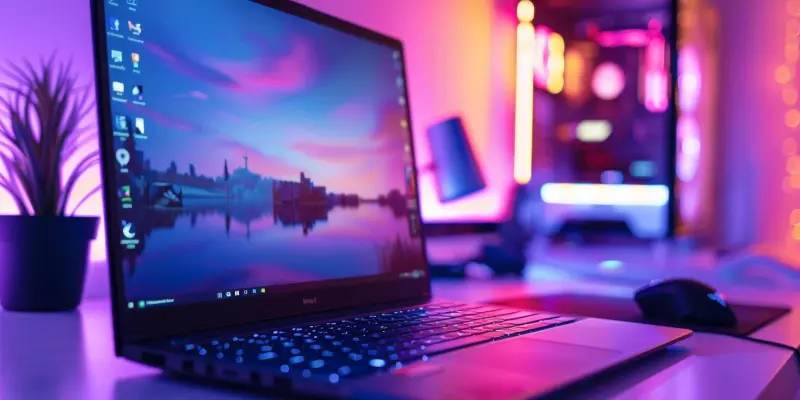In the ever-evolving world of gaming, recent developments have been altering how enthusiasts engage with technology. Notably, the rise of the RTX 4060 laptop GPU has captured attention, offering gamers unprecedented portability without sacrificing performance. This marks a significant milestone, with the RTX 4060 emerging as the first laptop GPU to seize the top spot since the RTX 3060 mobile gained popularity years ago. Its ascent reflects broader changes in the mobile gaming landscape, where users are gearing towards more efficient and powerful solutions that blend seamlessly into dynamic lifestyles. Coupled with advancements in processors and operating systems, these trends hint at a shift in hardware preferences and gaming habits. The infiltration of the RTX 5070 and 5070 Ti into the scene further signifies the increasing acceptance of Blackwell GPUs, reinforcing a new era in gaming technology. As AMD continues to expand its market share, the competition intensifies, promising diverse options for users seeking high-quality gaming experiences.
GPU Dynamics and Gaming Trends
The emergence of RTX 4060 laptops has significantly altered gaming dynamics, becoming apparent through shifting preferences among gaming enthusiasts. This evolution points towards an increased demand for portable yet highly capable devices that can perform on par with desktop counterparts. The RTX 4060 has proven to be a worthy contender, delivering impressive graphics and introducing enhanced gaming capabilities that cater to a growing segment of gamers who prioritize mobility. As these GPUs continue to gain traction, they challenge traditional setups and encourage users to consider the merits of gaming on laptops rather than dedicating resources to stationary systems. Moreover, NVIDIA’s innovations are not only influencing individual gamers but also shaping trends within the industry. This shift is underscored by the increased adoption and recognition of more advanced GPUs like the RTX 5070 and 5070 Ti, which highlight the ongoing pursuit of cutting-edge technology. Blackwell GPUs’ popularity aligns with this progression, indicating an expanding market where gamers continually seek superior graphical outputs that promise immersive experiences.
Meanwhile, the broader ecosystem surrounding gaming and hardware has witnessed considerable advancements, contributing to the allure of these laptops. AMD’s rise to a record high CPU share of over 38% illustrates the company’s impact on hardware preferences, driven by innovative products and a competitive edge against rivals like Intel. With the introduction of processors such as the Ryzen 9800X3D, AMD is redefining what users expect in terms of speed and performance, aligning well with the capabilities of modern GPUs. Simultaneously, Windows 11’s growth shows a trend towards embracing newer operating systems, which provide optimized functionality in support of high-end gaming experiences. This confluence of CPU advancements, GPU innovations, and operating system updates collectively enhances the RTX 4060 laptops’ appeal, making them a formidable option for gamers intent on pushing the boundaries of portable gaming devices while maintaining high standards in gaming performance.
RAM, OS, and Market Dynamics
In addition to GPU developments, significant trends in RAM, operating systems, and broader market dynamics are shaping gaming preferences. Users are shifting from using 16GB to 32GB RAM configurations in laptops, reflecting their readiness for more resource-intensive applications and games. This escalation in RAM signifies increased expectations from users who demand seamless multitasking capabilities and the ability to handle complex gaming scenarios without latency or lag. As memory demands grow, so too does the necessity for systems that can efficiently employ these resources, advancing gaming performance and user satisfaction. The presence of RTX 4060 laptops capable of supporting such configurations underscores their strategic advantage in a competitive market where user expectations continue to evolve. Operating systems play a crucial role in this transformation, with Windows 11 gradually replacing its predecessor, Windows 10, as the preferred platform for gamers. Microsoft’s decision to phase out support for older iterations has compelled users to adapt, resulting in a surge in Windows 11 adoption. This operating system’s alignment with modern hardware requirements marks a decisive shift towards embracing more optimized environments for gaming. In parallel, language and VR trends underscore the diversity within the ecosystem, illustrating how gaming is increasingly becoming a global phenomenon with diverse user preferences driving technological advancements. Consequently, these changes reflect broader trends within the tech industry, demonstrating how the convergence of innovative technology, market conditions, and user behavior is redefining gaming norms.
Throughout these developments, the RTX 4060 has positioned itself as a critical player in reshaping how gamers interact with technology. Besides enhancing portability, these advancements promote inclusivity, allowing a broader range of users to experience high-level gaming without the constraints imposed by traditional setups. As industry dynamics continue to evolve, these laptops represent a clear choice for those who value both performance and flexibility. This evolving landscape reinforces the importance of understanding current hardware preferences and market dynamics to appreciate the long-term implications for gaming technology.
Future Considerations and Implications
In the rapidly changing universe of gaming, recent advancements are transforming how enthusiasts interact with technology. The emergence of the RTX 4060 laptop GPU has gained attention for providing gamers unmatched portability coupled with robust performance. This development is noteworthy, as the RTX 4060 is the first laptop GPU to lead the market since the widespread success of the RTX 3060 mobile several years prior. Its rise indicates broader shifts in the mobile gaming arena, with users opting for more effective and powerful solutions that seamlessly fit into their dynamic lifestyles. Alongside improvements in processors and operating systems, these movements suggest an evolution in hardware choices and gaming behaviors. The introduction of the RTX 5070 and 5070 Ti cements the growing acceptance of Blackwell GPUs, heralding a new epoch in gaming technology. As AMD continues to expand its influence, the competition heats up, promising a wide array of choices for users seeking premier gaming experiences.

